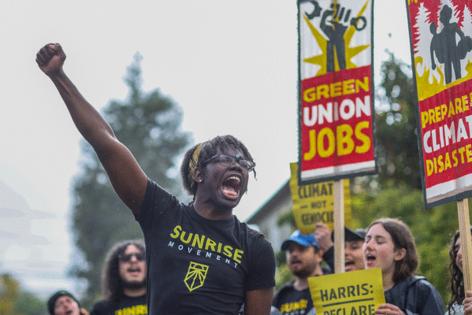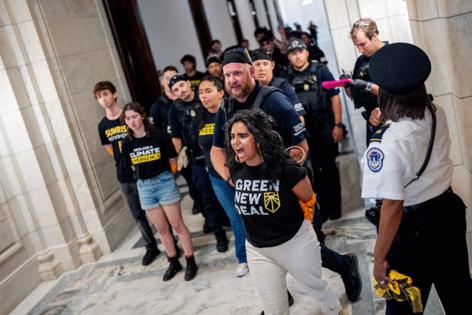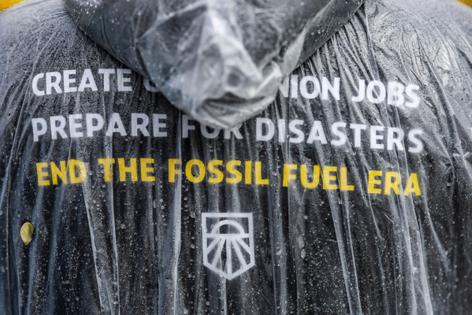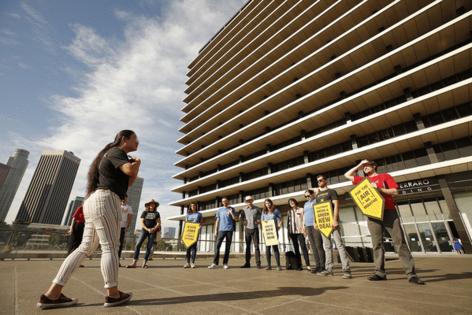Climate warriors fighting some of the 'greatest crises humanity has ever seen'
Published in News & Features
Aru Shiney-Ajay’s awakening to the climate crisis began in her late teens. On visits to family in India, she watched in horror as loved ones endured one disaster after another: deadly floods in her parents’ home state of Kerala and record-shattering air pollution in Delhi among them.
“The climate crisis was not just something in the background, but something that was already here,” she said. “That’s really what drove me to get involved in Sunrise.”
The Sunrise Movement was founded in 2017 by young climate activists frustrated by the mismatch between an accelerating global disaster and the staid pace of existing environmental organizations.
Theirs would be different: a movement organized for and by young people that would be unafraid of confronting powerful figures directly and dramatically.
They broke onto the national stage just a year later, when some 150 members staged a sit-in at the office of incoming Speaker Nancy Pelosi to demand that the newly elected Democratic majority commit to a Green New Deal.
Then a Swarthmore College student and volunteer trainer, Shiney-Ajay had helped coordinate the highly publicized action on Capitol Hill. After its success, she made the decision to leave college and work for Sunrise full time.
Last October, after a months-long search and a 95% confirmation vote from Sunrise’s volunteer delegates, Shiney-Ajay was named the organization’s executive director.
She is only the second person to lead the organization, which is based in Washington, D.C., and has thousands of members in 118 hubs in cities, towns and campuses across the U.S. There are 15 hubs in California alone.
“She is one of the sharpest and most compassionate leaders I have ever met,” founding director Varshini Prakash said in a statement last year. “I’m confident that under her leadership, Sunrise will reach new heights.”
Shiney-Ajay, 26, assumed leadership at a highly charged moment in U.S. politics. While the Democratic ticket of Vice President Kamala Harris and Minnesota Gov. Tim Walz has energized young progressive voters who were deeply skeptical of both President Biden and former President Trump, the outcome of November’s election remains a toss-up. Protests over the violence in Gaza and Israel have electrified university campuses. All the while, temperatures soar and acres burn, and the time left to save a sweltering planet seems to tick closer to zero.
The Times spoke with Shiney-Ajay this summer. The conversation has been edited for length and clarity.
What does it feel like to lead Sunrise after having come up as a volunteer?
I feel like I get to live out my purpose in life. It’s given me a lot of meaning and energy to face down some of the greatest crises that humanity has ever seen, and do it with hope and determination, with people who I trust at my side. Sunrise gave me that when I was a member, and it feels like a privilege to be able to give that back to thousands more people.
What appealed to you about Sunrise as a new member?
I’d never seen an organization that had so much vision for what is needed to stop the climate crisis, and also so much seriousness about the power it took to get there.
They were like, “OK, the way that we’re going to do it is we’re going to push the Democratic Party to see the urgency of the climate crisis. We’re going to expose the corrupting influence of fossil fuel billionaires on our politics. We’re going to tie the issue of good, green, union jobs to climate change, to make it clear that it’s not a choice between jobs and climate.”
Those were really clear interventions that opened up a whole new arena of possibility.
What does Sunrise mean when you say you want a Green New Deal?
The easiest way is to think about the New Deal, which was not just one bill but a series of bills, executive actions and local rulings that happened over multiple years [during the Great Depression]. It changed the legislative landscape, and the economic and cultural landscape of society too.
That is what we need in order to stop the climate crisis. It’s legislation at every level of government, change in every sector of society. That’s what the Green New Deal is about.
What era is Sunrise in now? What are your priorities at this point?
After [Congress passed] the Inflation Reduction Act, we decided that it was time for us to take some of those wins and start racking them up locally. So that’s how we launched the Green New Deal for Schools and the Green New Deal for Communities.
It was a way for us to win things locally, but also to develop our leaders and build our base. We’ve been doing that for the last couple years.
No matter what happens with the election this year, we’re really shoring ourselves up to take the fight back to the federal level. We’re starting to do that this year with the Climate Emergency Campaign.
What’s that?
It’s a campaign to get President Biden to declare a climate emergency, which basically unlocks a lot of different executive action powers. We are facing record-breaking temperatures, floods, fires, hurricanes. This is a state of emergency, and we need to use the full might of the federal government to do everything we can to stop it.
What do people misunderstand about your organization and the people it represents?
What we are asking for is not unreasonable. It’s not impractical. It’s actually the thing that is most in line with the physical realities of the world. As you get older, I think you start to think within the limitations of the political imagination, rather than the limitations of what literally must be done to keep millions of people alive.
People sometimes think of the Green New Deal as idealistic or impractical. Actually, I think it is the politicians who are being impractical about the reality of our situation.
Sunrise is explicitly for young people. Do members have to pack up and leave once they hit 35?
As long as young people are leading, then we welcome all the hands we can get. There’s been a lot of over-35 people in hubs who help us run logistics for training or give us their wisdom on how to plan actions or pass legislation in their city.
What does this generation understand that previous ones do not?
This generation grew up with the effects of the climate crisis being told to us since we were in elementary school, and so we know that this is an existential threat.
I also think this generation is just really oriented to justice and equality. And we’re not quite single-issue voters in the way that people maybe thought about voters 15 or 20 years ago.
When we spoke earlier this year, before President Biden withdrew from the race, you said your membership was deeply discouraged by the prospect of a Biden-Trump rematch. What’s your position on the election now?
Donald Trump is an existential threat to democracy and to our climate. Losing four more years to a president who actively promises to drill more fossil fuels would be planetary suicide. That’s why Sunrise will be doing everything we can to stop him from getting elected.
Vice President Harris’ record on climate is much more promising. As attorney general in California, she prosecuted oil and gas companies for pollution and sued the Obama administration for fracking. As vice president, she cast the tiebreaking vote on the Inflation Reduction Act, the country’s most significant climate legislation to date. With her in office, we actually have a chance at winning bold legislation that can tackle the climate crisis.
What is your message to young voters?
Our generation can turn the tide of politics. When we protested, voted and walked out in mass numbers, we won the climate legislation, an office of gun violence prevention, student debt relief, and a cap on prescription drug prices. If we vote for Harris this November, and then rally, protest and call for the scale of legislation we need, we will win the world we deserve.
Why has Gaza become an important part of Sunrise’s messaging?
We are a movement of young people, and the reality is that huge amounts of young people right now are speaking out against the war on Gaza. We think that it’s important to understand this as an election issue, alongside climate. The scale of death and destruction has been huge, and that has propelled it to a major issue for a lot of young people.
What are some of the harder decisions you see yourself having to make as a leader?
When legislation passes, there’s always a decision of how much to say, “That is not enough,” and how much to say, “I’m glad you did that.” It’s a strategic calculation every time.
One of the strengths of young people is that we are able to demand the biggest, boldest thing. But if you only ever demand the biggest, boldest thing, then it’s sometimes hard to ever feel like you’re winning, and people end up leaving because they feel like you haven’t won anything ever.
How have you evolved as an activist? Would anything about 2024 Aru surprise 2017 Aru?
I think I’ve gotten a lot better at being really disciplined about hope. It’s easy to feel like everything is falling apart when you look at the world. Something that Sunrise has taught me, and that I’ve learned from the world around me, is that hope comes through collective action but is also something that you need to practice. You don’t even know what spark will set something aflame. Just holding that hope within yourself can ignite that in other people.
©2024 Los Angeles Times. Visit at latimes.com. Distributed by Tribune Content Agency, LLC.














Comments